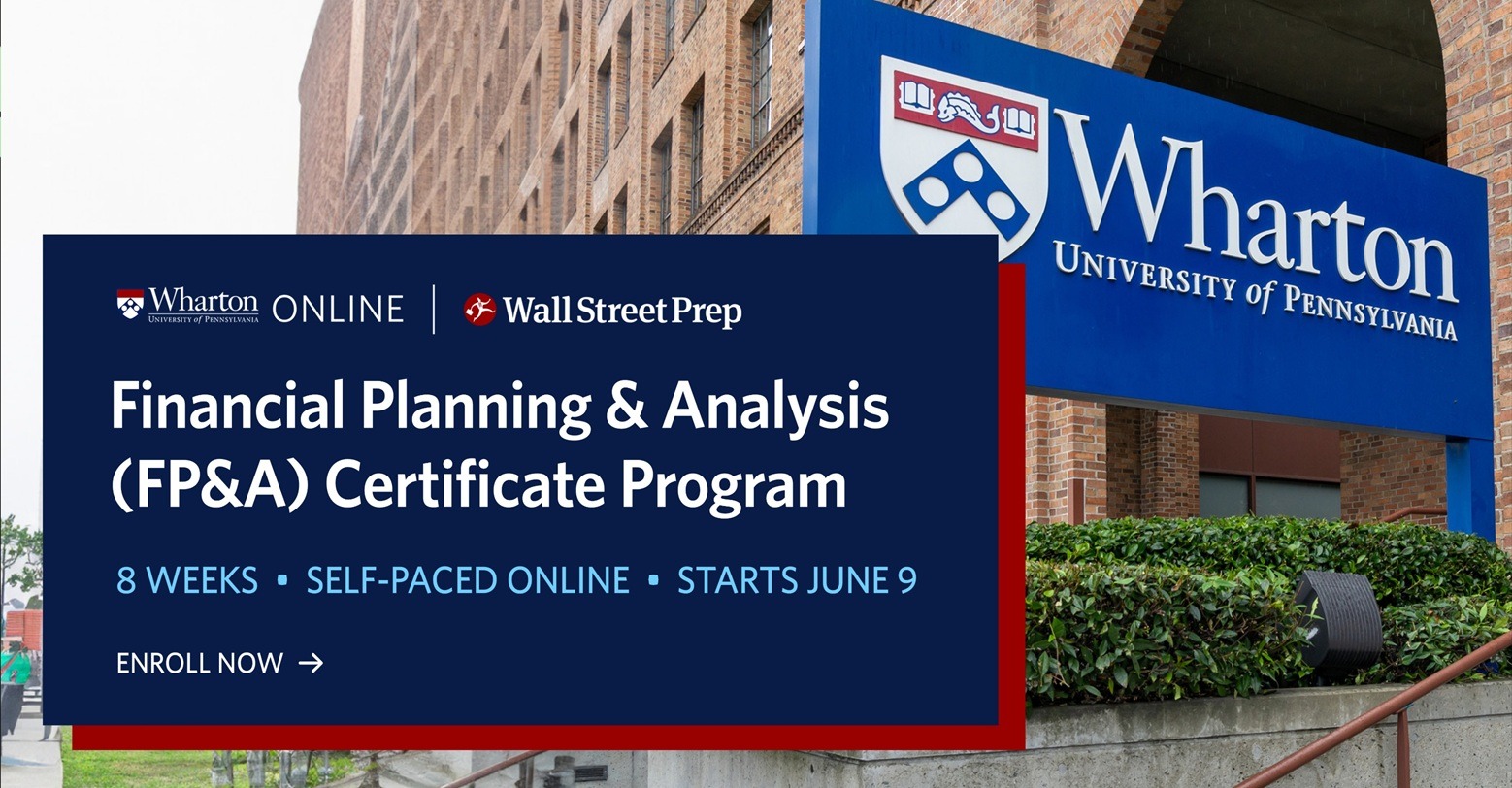Almost every large company out there has a financial analyst role. From auto manufacturers to investment banks, from hotels to government departments and from retail chains to consulting firms – everyone needs a financial analyst. This makes financial analysis a very valuable skill to have.
Financial analysts have to deal with numbers that are important to companies. So, the one skillset that all financial analysts need to have is the ability to understand, analyse and present those numbers in a format that is digestible by their target audience. That target audience can be management, clients, shareholders, regulators or any other stakeholders.
1. Financial Planning & Analysis (FP&A) Certificate Program from Wharton & Wall Street Prep
(Note: Use the above link and code BANKERSBYDAY for $300 off tuition on this course)
This 8 week certificate program focuses on financial planning and skills like forecasting, analysis, business partnering, and financial storytelling. You will learn from top faculty and industry leaders and upon successful completion, will be awarded a digital certificate from Wharton Online.
The course is suitable for FP&A analysts, finance professionals, accountants, consultants, business leaders and finance students from around the world. This is the same training that is used by some of the world’s top corporations and you will learn by doing real world case studies. Given the branding provided by Wharton and Wall Street Prep, this course is unmatched as a CV builder and career booster.

The certification is dived into eight modules covering topics like FP&A tools, the planning cycle, annual budgeting, forecasting, financial analysis, financial modelling, finance business partnering, reporting, presenting, financial storytelling and preparing for future tech like AI.
Click here and use code BANKERSBYDAY for $300 off tuition on this course!
Summary
| Duration | 8 weeks, at around 8 hours weekly |
| Format | Fully online |
| Level | Professional |
2. Managerial Finance from the London School of Economics and Political Science
Course Review
A great financial analysis course for mid level managers and executives. This course is well suited for learning to understand financial reports, analyse the financial health of your company, business or department, plan your budget, forecast your revenue and expenses and make investment decisions. A well structured and well delivered course overall.
The course does not require a finance background which makes it ideal for non-finance managers as well. But there is enough depth here for core finance professionals too. The first module covers financial statement analysis. You will learn how accounting works, how transactions are reported, how funds are used and reported, how various ratios and financial efficiency is calculated. You will also learn to forecast for the future and figure out funding.
Investment projects are evaluated using techniques like discounted cash flow and there’s a module that goes in-depth into this methodology. There are a lot of considerations and fine tuning that is required on the DCF model in real life and this course does a good job of covering all the bases. Other valuation techniques like multiples, and comparables are also explored in another module. This could help managers figure out the worth of a business vertical or an entire corporation.
Plenty of time is devoted towards funding and investment strategies. You will use scenario analyses, sensitivity analyses, break even methods, and other tools to figure out how to invest your financial resources. The opportunity cost of capital, CAPM, capital structure, investor behaviour and other core financial concepts are also explored in detail.
This is a great entry point into financial analysis for mid level managers and something all business leaders should know. LSE is also a super brand to have on your resume and this will go a long way to spruce up your LinkedIn profile and build your personal brand. An opportunity worth taking.
Click here and use code GS-AF-BBD15 for a 15% discount on this course!
Summary
| Duration | 6 weeks with about 10 hours a week |
| Format | Fully online, on-demand |
| Level | Executive |
3. Certified Financial Modeling & Valuation Analyst (FMVA) from CFI
Course Review
The FMVA is the premiere certification for financial analysts worldwide. It provides you with the CV value that you need to get a shortlist, the knowledge you need to clear the interviews and the desk ready skills to hit the ground running on your first day on the job.
The modular nature of the coursework is another unique feature. You have a bunch of optional prep courses that you can take base don your skill level. You can skip these if you already have a good grasp on those topics, thus saving you a lot of time. The same is true for the elective courses where you only take what you need.
For example, the elective courses include topics like startup/ eCommerce modeling, LBO modelling, M&A modelling, renewable energy modeling, reals estate modeling etc. You can pick and choose the ones you want to count towards your FMVA certification.
Additionally, there are some mandatory topics that each financial analyst has to be aware of anyway like business modeling, cash flow analysis, scenario and sensitivity analysis, dashboard and data visualisation etc. Everything you need as a financial analyst is in here and it is great.
The quality of the course material is excellent and it is delivered by professionals with years of experience in the field. The added brand value of the FMVA from the Corporate Finance Institute is something that anyone would want on their Resumes, especially in this tough market environment.
Click here and use code BBD10 for 10% off!
Summary
| Duration | 120-200 hours |
| Format | Fully online, on-demand |
| Level | Intermediate |
4. Managerial Finance from Kellogg School of Management
Course Review
A well structured financial analysis course that is ideal for mid to senior management and business owners. This course has been designed with a strategic perspective in mind and if you are a business leader or decision maker, this is where you need to be.
You start off with the quintessential introduction to corporate finance and financial statements. The basics of financial decision making, valuation techniques, setting financial objectives and so on. This is followed by modules on risk measurement, CAPM, cost of capital and investment decision making. This is a crucial component of investment decisions making not just at a firm level but for business verticals as well.
The middle portion focuses on cash flow forecasting and financial modelling. This includes identifying and explaining the variables involved, assumptions needed to create a cash flow model, evaluating projects and using DCF models. Capital structure is also covered with funding sources being evaluated, while also assessing the optimal capital structure of a firm.
The last module covers multiples valuation int he context of mergers and acquisitions. Inorganic growth through M&A is a popular choice for many firms and whatever side of the deal you may find yourself on, this is important information to know.
All in all, a solid financial analysis course for mid to senior level managers and you get a certification from Kellogg on your Resume. A good personal branding opportunity that should give you a nice mid career boost when coupled with the additional finance skills.
Click here and use code GS-AF-BBD15 for a 15% discount on this course!
Summary
| Duration | 6 weeks with about 8 hours a week |
| Format | Fully online, on-demand |
| Level | Executive |
5. Finance & Quantitative Modeling for Analysts Specialization from Wharton Online
Course Review
Wharton is one of the best brands you can get on your CV. It’s a top-rated business school and this course oozes the same quality that the financial services industry has come to expect of them. You learn from the top Wharton professors in Statistics, Finance and Accounting.
This course has been designed for Financial analysts, as you can judge from the title. In fact, there is another very similar course like this, but I chose this one to put on this list because of that analyst focus. The module on financial acumen and corporate finance should be helpful to all analysts. There is enough depth provided in the area of quantitative modeling to suit most financial analysts.
The rest of the course focuses on modelling, including handling spreadsheets. As someone who has worked in finance for a long time, I can tell you that spreadsheets become a part of your life. The better you are at handling them, the easier your life will be and the more you can impress your bosses. It’s an essential skill for financial analyst and this course provides a nice primer.
Summary
| Duration | 25 hours |
| Format | Fully online, on-demand |
| Level | Beginner |
6. Online Professional Certificate in Corporate Finance from NYIF
Course Review
If you are looking for a more advanced course for financial analysis, this is it. This course is better suited for investment/ corporate bankers, equity and debt analysts, traders and others who require a more advanced understanding of financial analysis. However, it will also prove indispensable to corporate financial analysts because of the topic overage which we discuss next.
The course covers everything you need as a financial analyst – starting with some basic accounting, business and project valuation, credit analysis, corporate finance, M&A, treasury management and so on. The topics are covered in sufficient detail and you will learn everything you need to as a financial analyst. This a more comprehensive and meaty course than others on this list.
NYIF is another solid brand to have on your CV. They have been teaching bankers, traders, financial analysts and even regulators for almost a century now. If you need a more advanced course that covers financial analysis, then this is it. I would also recommend this for professionals looking for a mid-career transition into finance.
Summary
| Duration | 60 hours |
| Format | Fully online, on-demand |
| Level | Intermediate |
7. The Complete Financial Analyst Course at Udemy
Course Review
The best course if you are an absolute beginner and want to focus mostly on the spreadsheet and accounting side of things. This course is not meant for financial analysts at banks (pick one of the other ones in this list for that) but rather for financial analysts involved in financial planning, budgeting, reporting and such roles which focus on the accounting side of things.
The course does present a lot of information relevant to financial analysts ranging from accounting basics and Excel magic to managing the finances, budgets and cash flows of companies. Most of what you need to know to hit the ground running or prepare for an analyst interview seems to be covered here.
The course quality is solid, and the concepts are well explained with the understand that the target audience is new to all these concepts. If you already know Excel and finance/ accounting basics, you would be better served with one of the more advanced courses featured above.
Summary
| Duration | 20 hours |
| Format | Fully online, on-demand |
| Level | Beginner |
What to look for in a Financial Analysis Course?
In order to make it as a financial analyst, you need desk-ready skills. Some of these skills may be acquired on the job but employers would want you to demonstrate your ability to be a good financial analyst beforehand. After all, there are plenty of candidates out there. Essentially, you are looking for three things:
- CV Value/ Personal Branding to get shortlisted
- Knowledge to ace the selection process
- Relevant desk-ready skills to hit the ground running and proving you can add value from Day 1
You not only need to demonstrate the skills, but you also need to add value to your CV. Majoring in Finance, Business or accounting will help, but you need some “desk-ready” skills which is what these courses will provide you. These courses are also offered by the world’s top universities or training providers which will make your CV stand out.
